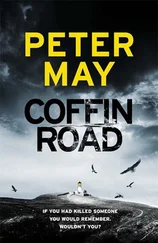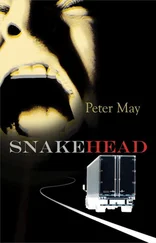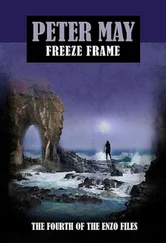‘And his death?’ Lapointe asked.
‘A sad accident, Jacques. He was concerned for Mrs Cowell when he heard about the murder. We think he went out in the storm to go and see that she was all right. It was dark. The island was being battered by a force ten or eleven. He must have lost his way and gone over the edge.’
Crozes drew another line through Morrison’s name before turning back to the room.
‘Then there’s Mr Clarke.’ He scratched his chin. ‘There was clearly antipathy on his part towards Cowell. He blamed him for the death of his father and the loss of their family boat. But his wife swears that he was home in bed, and we have absolutely no evidence to the contrary.’ He scored out his name. Then looked up at the one remaining suspect. ‘Which leaves us with Mrs Cowell. Who in my view is, and always has been, the most likely killer.’
Sime listened with growing disquiet as Crozes outlined the case against her. It was strong and indisputable, and he knew that in any normal circumstance he could not have found fault with it. But this was different, for one simple reason. He didn’t want it to be true.
Crozes said, ‘She is the only witness to the murder. She was there when it happened. She doesn’t deny that. She was covered in his blood. And, yes, she told us a story to explain that. But there is not one shred of evidence at the scene to support it. There is nothing to suggest that there was in fact a third party.’ He drew a deep breath. ‘She lied to us more than once. About being happy that her husband had left her. About not leaving the island. About not knowing he was coming back that night. She’s admitted to all that. Why would an innocent person lie?’
He looked around all the faces focused on him and knew that his summation was compelling.
‘She threatened him. Not directly. But she doesn’t dispute that she told Ariane Briand that if she couldn’t have him she’d see that no one else could. In his last interview with her, Sime very clearly, very concisely, outlined the most likely scenario. We’ve all seen the tapes by now. He accused her of luring her husband back to the island by threatening to set their house on fire, and killing him in a fit of jealous rage. He suggested that, immediately filled with remorse, she tried to revive him, and when she failed made up a story about an intruder.’ He looked at Sime. ‘Powerful stuff, Sime.’ There was an edge in his voice.
Sime felt his face colour. He didn’t want the credit for any of this. It was almost as if Crozes knew it and was deliberately salting a wound that Sime couldn’t even acknowledge. And any praise coming from Crozes had a double edge to it in the light of the previous night’s events. Sime stayed focused. ‘There are two problems,’ he said.
‘Oh?’ Crozes tried to look interested. ‘And what are they?’
‘The guy who attacked me two nights ago. You say there’s no evidence that Kirsty Cowell’s claimed intruder exists. But this guy fitted the description, right down to the ski mask.’
‘And that could have been anyone trying to deflect suspicion away from themselves.’
‘Like who?’
‘Like Owen Clarke.’
‘Who has an alibi. And no motive that I can think of for attacking me.’
‘His son, then. He might have felt you humiliated him in front of his friends and wanted to teach you a lesson.’
‘He also has an alibi.’
Crozes was scathing. ‘Yes, if we’re to believe his pals. And think about it, Sime. What possible motive could the killer have for attacking you? I think this is a red herring. And I don’t want us wasting time on it. What’s the second problem?’
‘Simple,’ Sime said. ‘We don’t actually have any physical evidence against Mrs Cowell.’
‘Oh, but we do.’ Crozes’s smile was laden with satisfaction. ‘Or, at least, we might have. The autopsy report shows that Cowell had scratches on his face, almost certainly made by fingernails.’ He paused. ‘Mrs Cowell claims that her attacker was wearing gloves. So how could he have left scratch marks? If forensics can match the residue taken from beneath Mrs Cowell’s nails with skin from Cowell’s face we’ve got her.’
Sime was halfway across the car park to pick up the Chevy and take it back to the Auberge when he realised that he’d left his cellphone lying on the desk in the incident room. He hadn’t charged it for several days and needed to plug it in when he got back to his room. He hurried past the cormorant sculpture on the front grass and up to the main door, just as Marie-Ange was coming out. She had been searching for something in her bag as she came through the door and almost bumped into him. A tiny gasp of surprise escaped her lips as they found themselves just inches apart. Her surprise quickly gave way to anger, and he almost withered under its simmering virulence. She glanced quickly behind her. There was no one in the hall. And under her breath she said, ‘I should just have shot you. Then we’d both have been put out of your misery.’
‘Well, since you’re the source of it, maybe you should have turned the gun on yourself.’
Her lips formed themselves into a sneer. ‘You’re so fucking smart, Simon.’
‘At least I’m honest.’ Strangely, he felt quite emotionally detached. ‘And maybe you should have shot me. You’ve done just about everything else to me.’
She pushed past him to stride off down the path. But he caught her arm. Her head whipped around. ‘Let go of me!’
He said, ‘I’m so glad we never had that kid.’
An odd, sick smile flitted across her face. ‘Yeah, be grateful. It wasn’t even yours.’
She pulled her arm free and hurried away around the side of the building.
He stood staring after her, his face smarting as if she had slapped him. Until now he had thought it impossible for her to hurt him any more than she already had.
The news of Marie-Ange’s pregnancy had changed the way he felt about everything. If he had spent his life searching for something, a reason for being, a point to his existence, then suddenly it seemed that he had found it.
But from the start Marie-Ange had been ambivalent. Sime had been unable to understand why she didn’t share his excitement. They had been going through a difficult time, and it seemed to him that a child could provide the glue that would keep them together. But looking back on it later, he realised that she had probably only seen it as an impediment to their breaking up. A responsibility to child and family that she didn’t want.
They’d had a debate about the scan. Sime had wanted to know the sex of their child. She had not. And, as usual, she prevailed.
Four months into the pregnancy, and having regular appointments with the gynaecologist, she still appeared to have little or no maternal instinct. And yet Sime’s sense of fatherhood had been powerful. He had found himself seeing children on their way home from school and imagining how it would feel to be a father. Bringing back memories of his own first day at school, insisting that he could find his way home himself, and then getting lost. He had even caught himself looking at prams and baby seats for the car.
It had stirred memories, too, of the story about his ancestor delivering the baby on the boat, and the moment of parting at Grosse Île when the child had gripped his thumb with tiny fingers. Sime had wanted that feeling. The unqualified and absolute love of a child. The sense that a part of him would live on when he had gone.
At about seventeen weeks Marie-Ange had taken a week’s leave to visit her parents in Sherbrooke. Sime was upcountry on a case the day she was due back. That afternoon he got a call to say she’d been rushed to hospital with severe bleeding, but it was twenty-four hours before he was able to get back to Montreal.
Читать дальше












